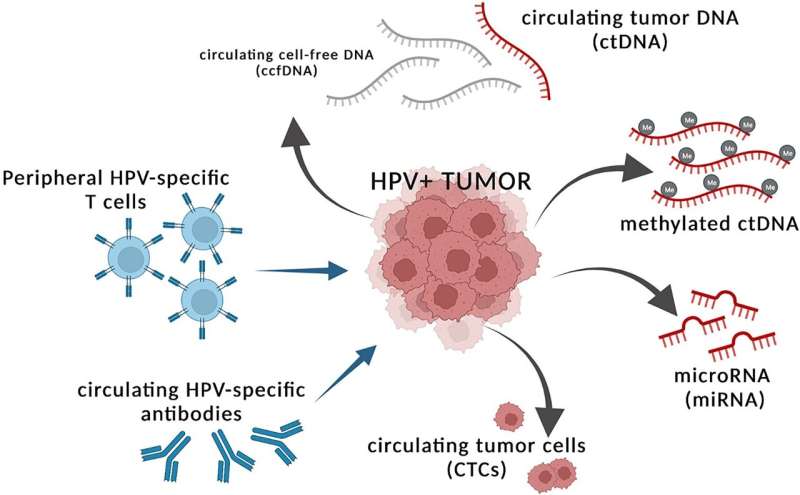Tumor intrinsic and extrinsic factors in the periphery that can serve as proxies of tumor burden. Credit: Oncotarget (2023). DOI: 10.18632/oncotarget.28487
A new review paper was published in Oncotarget entitled, "Peripheral surrogates of tumor burden to guide chemotherapeutic and immunotherapeutic strategies for HPV-associated malignancies."
With the rapid adoption of immunotherapy into clinical practice for HPV-associated malignancies, assessing tumor burden using "liquid biopsies" would further our understanding of clinical outcomes mediated by immunotherapy and allow for tailoring of treatment based on real-time tumor dynamics.
In their new review, researchers Meghali Goswami, Jeffrey Schlom and Renee N. Donahue from the National Cancer Institute examine translational studies on peripheral surrogates of tumor burden derived from peripheral blood in HPV-associated malignancies, including levels and methylation of circulating tumor DNA (ctDNA), miRNA derived from extracellular vesicles, circulating tumor cells (CTCs), and HPV-specific antibodies and T cell responses.
"We review their utility as prognostic and predictive biomarkers of response to chemotherapy and radiation, with a focus on how they may inform and guide immunotherapies to treat locally advanced and metastatic HPV-associated malignancies. We also highlight unanswered questions that must be addressed to translate and integrate these peripheral tumor biomarkers into the clinic."
More information: Meghali Goswami et al, Peripheral surrogates of tumor burden to guide chemotherapeutic and immunotherapeutic strategies for HPV-associated malignancies, Oncotarget (2023). DOI: 10.18632/oncotarget.28487
Journal information: Oncotarget
Provided by Impact Journals LLC
























